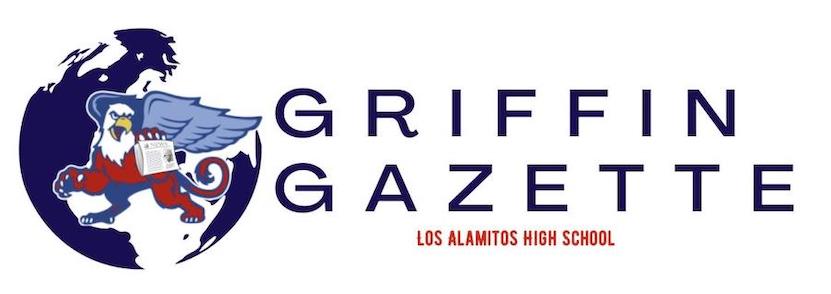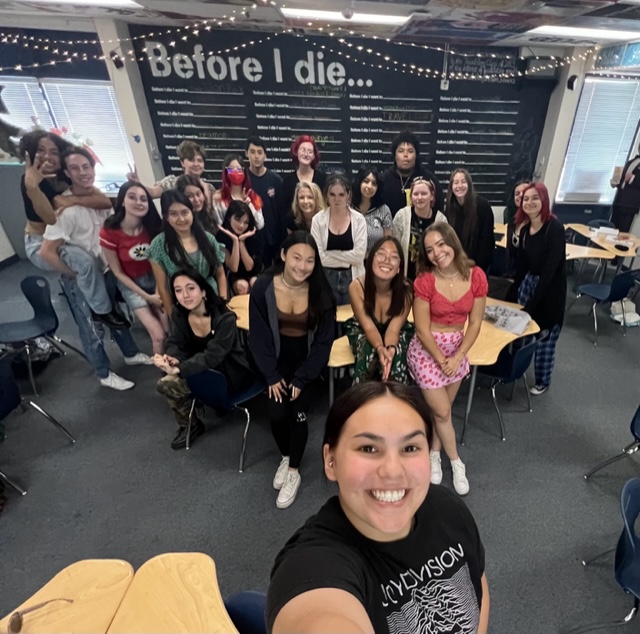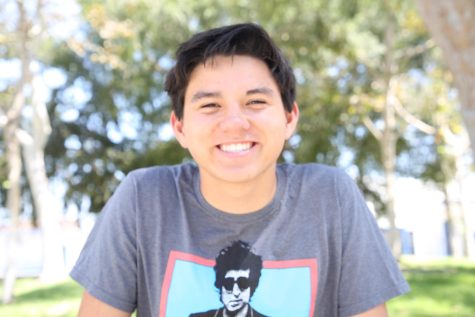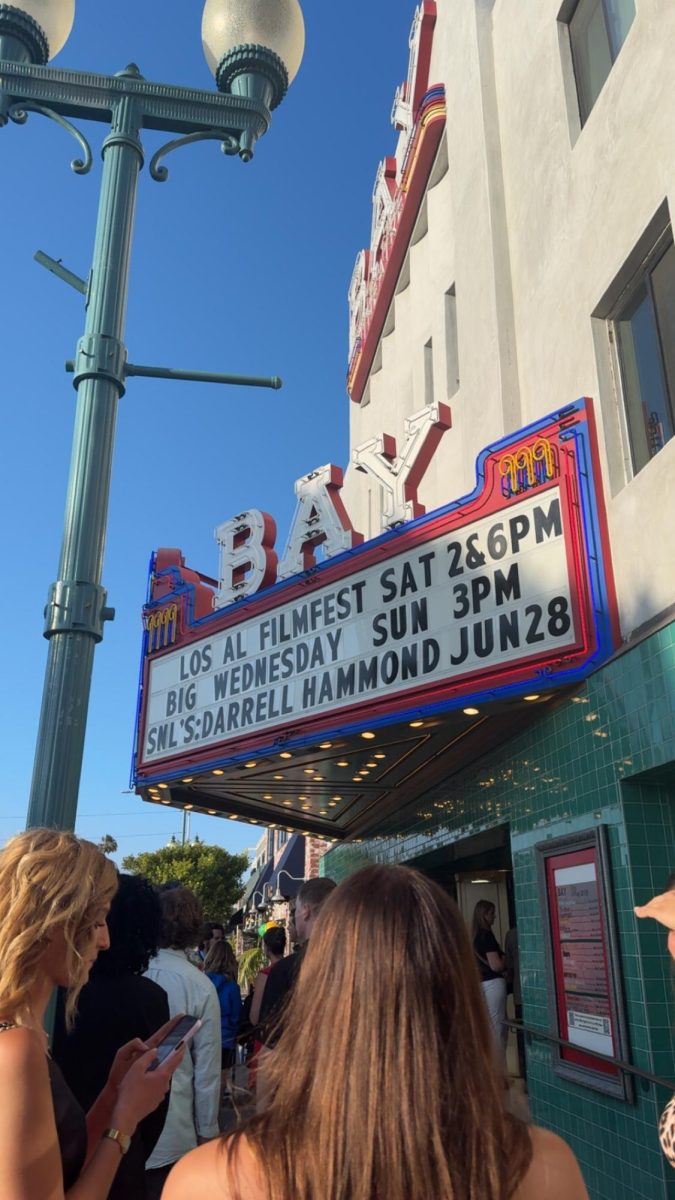Death and grief: a tough subject to tackle
Thanatology is an English elective taught by Mrs. Franzen.
Thanatology class of 2022., returning after a five long. (Michael Warren)
March 1, 2023
LOS ALAMITOS, CA—This week, Griffin Gazette is taking a deep dive into the Mythology and Folklore class, which is an optional English elective. The course takes place only in the spring semester because, in the fall semester, it was the Mythology and Folklore class, which Griffin Gazette previously did a spotlight on. Mostly seniors are enrolled, but it is offered to 10th-12th grade students.
What is Thanatology?
Thanatology is a field of study very few students are familiar with. Mrs. Franzen teaches the class, she has been doing so since 2007.
“It is the study of death and dying, grief, how to process loss,” said Mrs. Franzen. “It is the most real class that students will take in high school. All of us will experience the death of someone we love, losing friendships, and learning how to understand that and move through that in a healthy way is extraordinarily valuable.”
Thanatology seems to be a class that is unique to Los Alamitos High School. “I don’t know of any other high school offering this class,” Mrs. Franzen said, “I haven’t found anything.” It started in the 1980s when there were a lot of student deaths. The purpose was to introduce healthy ways for the student body to cope. It was originally an English class, not an elective. However, due to the Williams Act in 2004, it was forced to become an elective.
“It’s a very heavy class,” Mrs. Franzen warned. “It’s draining to teach it because everyone brings in their grief—it’s not something that we can leave at the door—but the conversations are very rich and it gives students an opportunity to be hands-on with a topic that is very tabooed.”
Why take Thanatology?
A large part of the class deals with looking at several perspectives of death and the subsequent process. Students are given the opportunity to examine the rituals of the five major world religions as well as how different cultures view death and dying.
Mrs. Franzen invites several speakers to give their first-hand accounts in detail. “We’ve had a rabbi, a pastor, a Muslim woman, a pagan, and a Buddhist all come in and speak,” Mrs. Franzen said.
The class goes in depth to answer the really uncomfortable questions that no other class touches. Questions like what does it mean to die? What does the afterlife look like? What rituals are there built around death? How do you process loss?
Students also examine different pieces of literature that speculate about these topics. They read excerpts from Dante’s Inferno, which is an epic poem about the journey through the Christian hell, purgatory, and heaven; selections from The American Way of Death by Jessica Mitford, which is a book that exposed the abusive practices of the American funeral industry; a few passages from Mitch Albom’s The 5 People You Meet in Heaven; and a deep dive into the work of Elisabeth Kübler-Ross, a Swiss-American psychiatrist, who proposed the 5 stages of the grief cycle.
“What’s interesting about Kübler-Ross’s work is that she tells us that we will reach acceptance, but she doesn’t explain how we get there,” Mrs. Franzen added.
The class also examines several practical skills that will come in handy in the lives of students in the distant future. “Toward the end of the semester, we look at how funerals are planned, legal terms such as do-not-resuscitate orders,, how the drafting of will work, and what happens during an autopsy,” Mrs. Franzen said.
The class places special emphasis on what one should say when a friend or family member is grieving. “We look at what are the best things to say to someone dealing with grief, and we look at why saying ‘let me know what I can do for you’ is a cop-out.”
Students are exposed to several types of burials other than in-ground burials.
Of course, the topic of death and mortality is not a savory topic. Due to the heavy and graphic nature of the class, it may not be suited for everyone. “It’s human to be interested in this topic,” Mrs. Franzen said, “as much as we’d like to pretend that we can escape it, we can’t and how do you reach acceptance if you don’t talk about it?”
“The class is really geared for students with an open mind to explore other religions and perspectives in the interest of empathy and a better understanding of the world,” Mrs. Franzen continued, “we don’t want to come at it from a place of judgment.”
The class is not all centered around bleak topics. “Every year we have the joy of living project, inspired by the artist Candy Chang who created the ‘Before I Die’ walls,” Mrs. Franzen said.
The “Before I Die Wall” is a black wall with the words “Before I die, I want to . . .” in white lettering. People are supposed to finish that sentence by writing their goals. The purpose, of Before I Die, is a global art project that invites people to reflect on their mortality and what matters the most,” says the Before I Die Project website. There are several famous “Before I Die” murals all over the world. Mrs. Franzen has personally seen some in Berlin, Madrid, and Rome. Several of Mrs. Franzen’s former students have sent her pictures of Before I Die walls on their college campuses.
So, in the spirit of the class, Mrs. Franzen painted a Before I Die mural in her classroom along with a basket of chalk next to it. In the top right-hand corner of the wall is an inscription that reads:
“This wall has been established by the Thanatology Class of 2013 in the interest of facilitating the growth of individual thoughts, hopes, and dreams.”
Any students in all of Mrs. Franzen’s classes are able to contribute to the Before I Die wall, not just the Thanatology students.
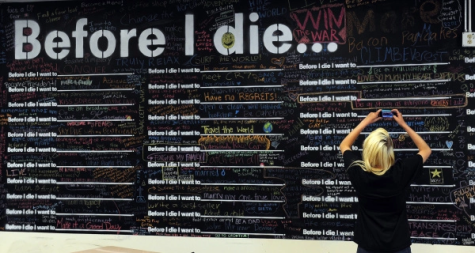
“It was gnarly what some students were writing because it was so raw and so real,” Mrs. Franzen said. “It was real in a way that we never are at school, so in that way, it had and continues to have power.”
Griffin Gazette made a poll for the Thanatology students to give their perspectives on the class.
“I am very interested in philosophy and the study of death,” Audrey Kranson, senior, said. “I love to learn about other people’s points of view and I thought that Thanatology was the perfect opportunity to earn that insight.”
“While it is a heavy subject,” another senior Jonas Corliss said, “the environment is very kind and supportive.”
Overall, the Thanatology class is extremely unique. It is an opportunity for students to explore a heavily stigmatized topic in a healthy and constructive manner.

